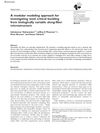 7 citations,
July 2019 in “International archives of internal medicine”
7 citations,
July 2019 in “International archives of internal medicine” Common skin conditions can greatly affect a person's mental health and social life.
 5 citations,
December 2022 in “Toxins”
5 citations,
December 2022 in “Toxins” Neurotoxins can affect neurotransmitter release and have potential in treating muscle, pain, and cancer conditions, but more research is needed on how they work.
 5 citations,
January 2013 in “Journal of Cosmetics, Dermatological Sciences and Applications”
5 citations,
January 2013 in “Journal of Cosmetics, Dermatological Sciences and Applications” New treatments for hair loss are promising.
 2 citations,
August 2019 in “Journal of skin and stem cell”
2 citations,
August 2019 in “Journal of skin and stem cell” The study concludes that regulating apoptosis could lead to new treatments for various skin and hair conditions.
 2 citations,
January 2023 in “Sexual Medicine”
2 citations,
January 2023 in “Sexual Medicine” The Men's Training Cup Keep Training masturbation aid may help delay ejaculation and improve erectile function.
1 citations,
November 2023 in “International journal of molecular sciences” Cannabinoids might help treat skin problems but more research is needed to be sure.
 1 citations,
September 2023 in “Stem cell research & therapy”
1 citations,
September 2023 in “Stem cell research & therapy” Mesenchymal stem cells could help treat aging-related diseases better than current methods.
 1 citations,
July 2022 in “Frontiers in Microbiology”
1 citations,
July 2022 in “Frontiers in Microbiology” MSM supplementation in kittens improves hair quality and growth rate without harming their health.
 December 2024 in “Nutrients”
December 2024 in “Nutrients” Skin, hair, and nail changes can help detect eating disorders early.
 May 2024 in “International Journal of Nanomedicine”
May 2024 in “International Journal of Nanomedicine” Biodegradable polymers can improve cannabinoid delivery but need more clinical trials.
March 2024 in “Antioxidants” Excessive blue light harms eye cells and disrupts sleep patterns.
February 2024 in “IntechOpen eBooks” Proper nutrition can help manage PCOS symptoms and improve overall health.
 February 2024 in “BMC health services research”
February 2024 in “BMC health services research” Policymakers should integrate criteria like risk of harm, skills, qualifications, and teamwork to define allied health professions in Malaysia.
 January 2024 in “Current research in toxicology”
January 2024 in “Current research in toxicology” Thallium is highly toxic, causing severe health issues, and Prussian blue is the best antidote.
 December 2023 in “European Journal of Psychology Open”
December 2023 in “European Journal of Psychology Open” Men who are perfectionists feel more upset about baldness, partly due to aging anxiety.
November 2023 in “Children” Many pediatric epilepsy patients experience preventable severe adverse drug reactions, especially with certain medications and risk factors.
 August 2023 in “Medicina-lithuania”
August 2023 in “Medicina-lithuania” Abusing steroids can damage your heart, muscles, reproductive system, liver, skin, and brain, and may increase the risk of Alzheimer's disease.
 May 2023 in “Journal of managed care & specialty pharmacy”
May 2023 in “Journal of managed care & specialty pharmacy” Alopecia areata causes hair loss and life quality issues; current treatments are often unsatisfactory, but new drugs like JAK inhibitors show promise.
December 2023 in “International journal of molecular sciences” Chromosomal differences affect how muscle cells respond to testosterone.
 April 2022 in “Anti-cancer agents in medicinal chemistry”
April 2022 in “Anti-cancer agents in medicinal chemistry” Some existing medicines show promise as safe treatments to protect against the side effects of radiation therapy.
September 2022 in “Dermatology and therapy” Androgenetic alopecia is linked to heart disease, metabolic issues, and mental health problems.
 1 citations,
January 2020 in “Elsevier eBooks”
1 citations,
January 2020 in “Elsevier eBooks” Forensic medicine is crucial for justice and needs continuous innovation and technology integration.
 106 citations,
March 2014 in “BioEssays”
106 citations,
March 2014 in “BioEssays” We need more research to better understand human hair follicle stem cells for improved treatments for hair loss and skin cancer.
 83 citations,
May 2013 in “International Journal of Molecular Sciences”
83 citations,
May 2013 in “International Journal of Molecular Sciences” Skin development in mammals is controlled by key proteins and signals from underlying cells, involving stem cells for maintenance and repair.
 70 citations,
February 2019 in “The journal of immunology/The Journal of immunology”
70 citations,
February 2019 in “The journal of immunology/The Journal of immunology” Short-chain fatty acids from *Cutibacterium acnes* cause skin inflammation, contributing to acne.
 August 2020 in “Textile research journal”
August 2020 in “Textile research journal” The model helps understand how wool fiber structure affects its strength and flexibility.
 25 citations,
April 2021 in “npj Regenerative Medicine”
25 citations,
April 2021 in “npj Regenerative Medicine” Mathematical modeling can improve regenerative medicine by predicting biological processes and optimizing therapy development.
 12 citations,
August 2016 in “Current opinion in genetics & development”
12 citations,
August 2016 in “Current opinion in genetics & development” Organs like hair follicles can renew themselves in complex ways, adapting to different needs and environments.
 November 2023 in “Frontiers in veterinary science”
November 2023 in “Frontiers in veterinary science” The study provides insights into hair growth mechanisms in yaks.
 30 citations,
October 2016 in “Current research in translational medicine”
30 citations,
October 2016 in “Current research in translational medicine” Hair follicles on the scalp interact with and respond to the nervous system, influencing their own behavior and growth.
























